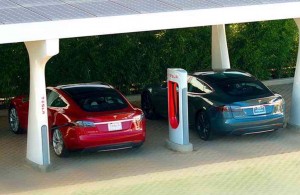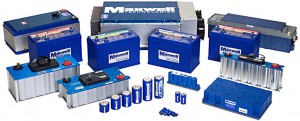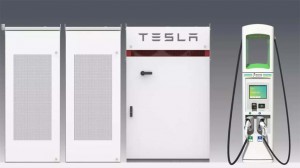Tesla will spend $218 million to acquire Maxwell Technologies, an energy company that could help it both reduce battery costs and develop a battery alternative called an ultracapacitor.
Separately, Electrify America, a company dedicated to promoting and supporting electric vehicles, plans to use Tesla’s Powerpack battery backup system at more than 100 of its EV charging stations.
“We are always looking for potential acquisitions that make sense for the business and support Tesla’s mission to accelerate the world’s transition to sustainable energy,” Tesla said of the planned purchase of Maxwell in a statement.
(Tesla misses Q4 earnings. Click Here to see why that is raising new concerns.)
The all-stock sale will see Tesla price Maxwell’s 45.9 million shares at $4.75 apiece, a 55% premium over the closing price on Friday. That values Maxwell at $218 million.
The San Diego-based company is developing a technology called ultracapacitors. Unlike batteries, they can take on or release energy quite rapidly and offer a number of potential advantages, including ultra-fast charging. They cannot hold as much energy as batteries, at least in current form, however.
Tesla CEO Elon Musk has highlighted the technology in the past and once indicated his interest in conducting research on them at Stanford University.
Henrik Fisker, the one-time head of Fisker Automotive, had indicated his own interest in using ultracapacitors for a new line of electric vehicles two years ago but subsequently said they were not yet ready for production.
Maxwell has another potential benefit it could bring to Tesla, Oppenheimer analyst Colin Rusch said in a note sent to investors on Monday. It is developing a method of producing components for batteries that could significantly lower their costs. Bringing down the price of batteries is widely considered one of the keys to taking electric vehicles mainstream. A recent Deloitte study suggested that battery-electric vehicles could become cost competitive with conventional, gas-powered vehicles by as early as 2022, but other observers think it could take years longer.
“We view battery cost, weight, and performance as the key drivers” towards increasing the appeal of electric vehicles, Rusch said in the note. The battery technology under development by Maxwell, “plus applications for its ultracapacitor technology seem likely to be integral in evolving (Tesla’s) pack design and performance, particularly in heavier vehicles that rely on regenerative braking for system economics.”
The takeover could help Tesla in a bid to develop next-generation batteries, often referred to as “solid state,” as they eliminate the liquid component of today’s battery. That has the potential to lower costs, improve performance, reduce charge times and eliminate the fire risks currently associated with lithium-ion batteries, experts have said.
“Tesla is a well-respected and world-class innovator that shares a common goal of building a more sustainable future,” said Dr. Franz Fink, President and Chief Executive Officer of Maxwell. “We believe this transaction is in the best interests of Maxwell stockholders and offers investors the opportunity to participate in Tesla’s mission of accelerating the advent of sustainable transport and energy.”
The Maxwell technology could have applications in another key Tesla product line, its Powerpack battery backup system. During a conference call to discuss its fourth-quarter earnings last week, Tesla CO Musk said he sees more rapid growth opportunities in that side of the company’s business than in its automotive manufacturing.
(For more on Electrify America’s plans to purchase Tesla Powerpacks, Click Here.)
Tesla will provide more than 100 of its battery backup systems to Electrify America for use at the charging stations it is setting up across the U.S.
Electrify America was established with $2 billion in funds set aside by Volkswagen as part of it’s a deal with U.S. and California regulators to settle its diesel emissions cheating scandal. Some of the money will be used to promote electric vehicles but much of the funding will go to the network of charging stations Electrify America is setting up across the U.S. That includes hundreds going into Wal-Mart shopping centers, as well as others being set up along major cross-country travel routes. Two stations recently opened along the Ohio Turnpike, part of the I-80 route from New York to California.
The Powerpacks will help level demand on the grid, according to the VW-funded enterprise. Each of the backup systems will have a capacity of 350 kilowatts of energy.
“Our stations are offering some of the most technologically advanced charging that is available,” said Giovanni Palazzo, chief executive officer of Electrify America. “With our chargers offering high power levels, it makes sense for us to use batteries at our most high demand stations for peak shaving to operate more efficiently. Tesla’s Powerpack system is a natural fit given their global expertise in both battery storage development and EV charging.”
Other charging services, such as EVgo, as well as Tesla’s own Supercharger network, are also looking to use battery backup systems. They provide numerous potential advantages. They can level off demand from the grid and allow a charging station to keep operating, even in a brown- or black-out. They also can be charged up during off-hours, when electric rates are lower, while still providing customers with power throughout the day.
(Tesla launches sales of base-level Model 3 in China. Click Here to find out why Americans can’t buy the new version.)



